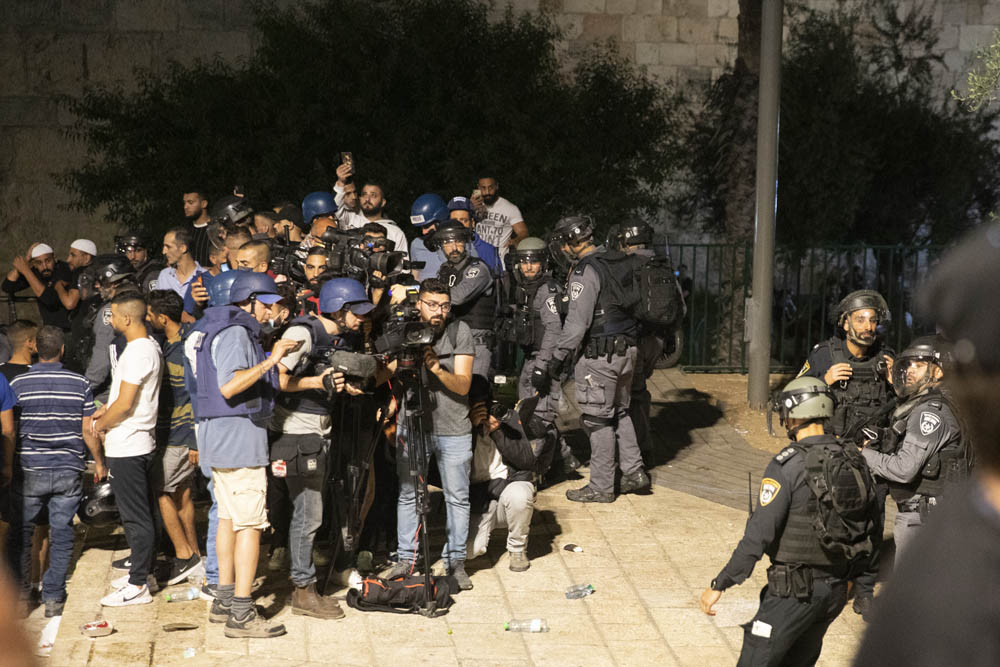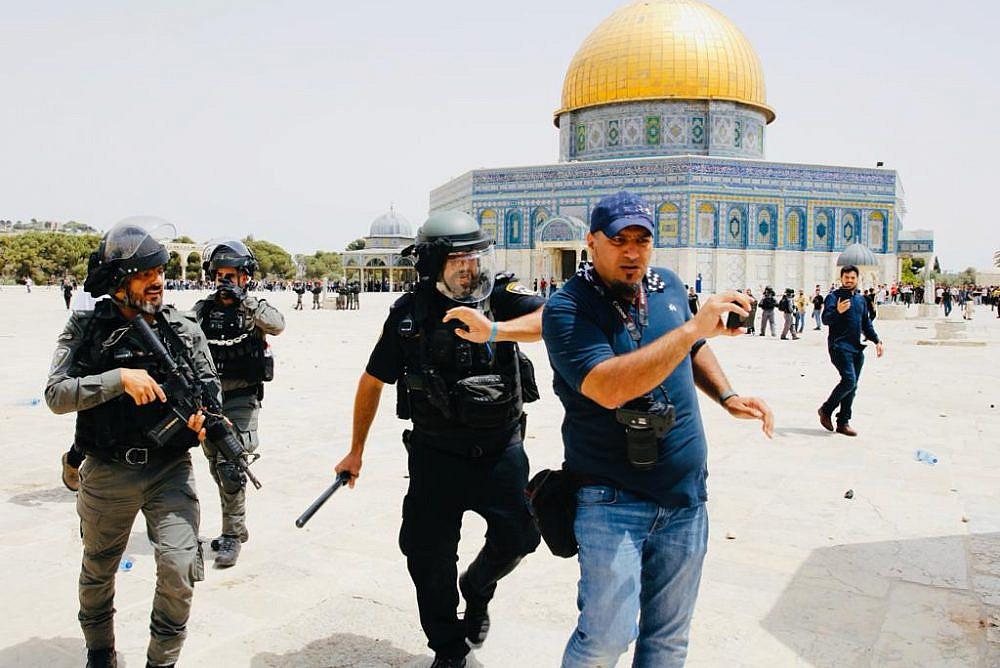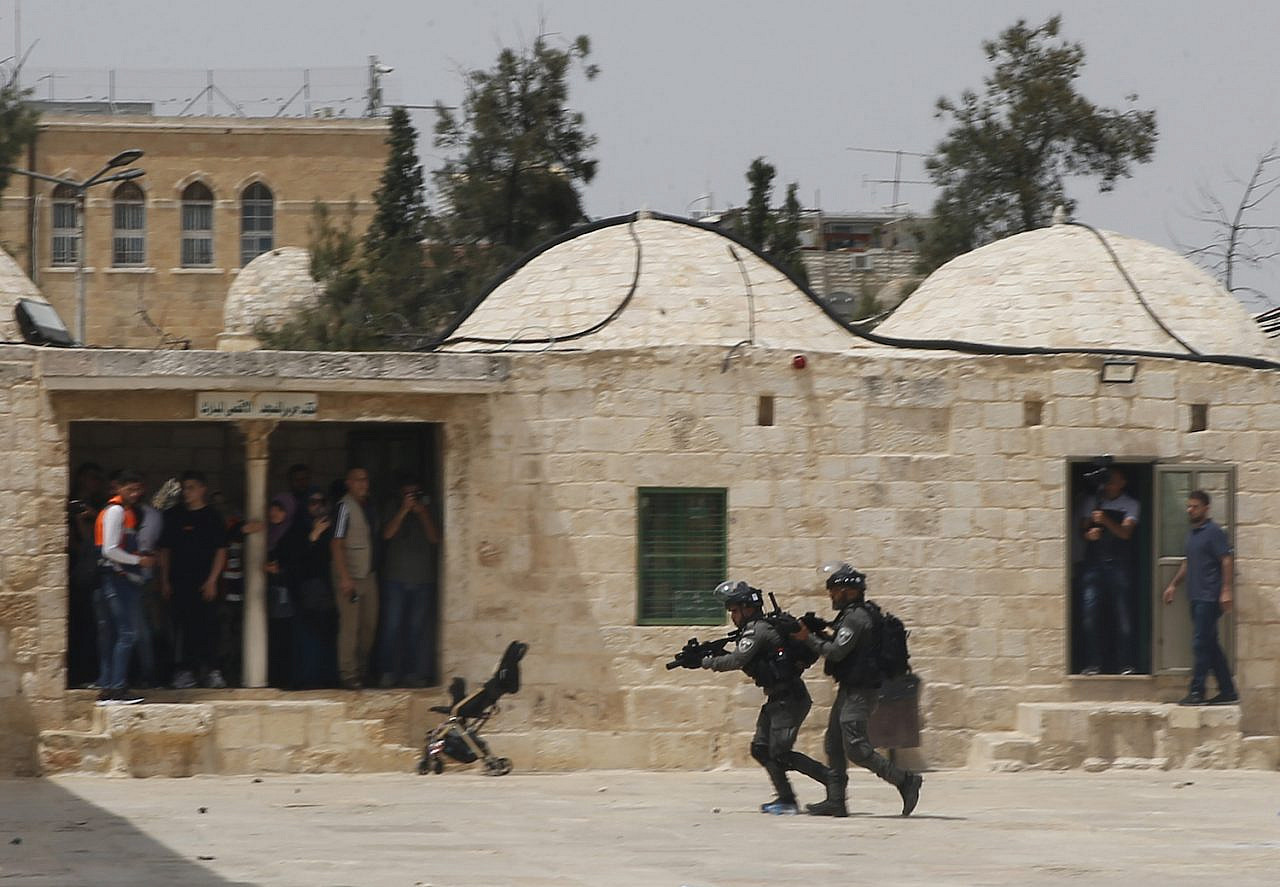On May 7, as tensions mounted in Jerusalem, a Palestinian photojournalist at Al-Aqsa Mosque compound, in the Old City, trained his video camera on an Israeli police officer. The police had begun their incursions into the site as protests against evictions of Palestinians in East Jerusalem were growing. The Palestinian journalist at Al-Aqsa filmed as the police officer yelled a threat — “One more time and I’ll break your cameras — get out!” — then lunged, causing the journalist to drop their camera.
In another video, police are seen attacking another Palestinian journalist, even as the reporter is telling them that he has authorization to be at the compound. And last Friday, police beat Ahmad Gharabli, a Palestinian photojournalist with Agence France-Presse, with a baton.
“I arrived to cover the Friday prayers at the mosque, as usual,” said Gharabli, a veteran, award-winning photojournalist. “One police officer started beating me with a baton, even though I had identified myself as a journalist. I kept filming throughout his assault. He beat me with the baton eight times, on my knee and legs. Another officer pressed the barrel of his rifle into my back.” The attack was intense enough that, the following day, Gharabli underwent a medical exam; there were no fractures, but his legs remain dotted with bruises.
Gharabli and the other journalists are far from alone. While Israeli and international members of the press have also been attacked, Palestinian journalists have been targeted disproportionately: at least 15 journalists have been wounded by Israeli forces since the beginning of May, of whom 13 are Palestinian. Along with other restrictions imposed by Israeli authorities, the attacks, say press advocates, hamper press freedoms in what has become a major flashpoint for violence surrounding Israel’s occupation of Palestine.
Over the past month, as Palestinians continued protesting the imminent expulsion of Palestinian families from Jerusalem’s Sheikh Jarrah neighborhood, police assaults on journalists have increased, according to the Union of Journalists in Israel.
“Lately, we have witnessed a worrying increase in the number and frequency of violent attacks against the press, both by security forces and citizens,” the Union said in a statement. “Journalists and photographers who are sent by their newsrooms to cover events are finding themselves to be a direct target of violence, often to the point of physical attacks. We demand Israeli police to ensure the safety of journalists, and to give clear orders to officers at the scene to allow all media teams to do their jobs and ensure the freedom of the press.”
The Al-Aqsa compound has long been recognized as a tinderbox in the Israeli-Palestinian conflict. Also known as Haram al Sharif, it is the third holiest site in Islam. According to a status quo agreement, non-Muslims can visit the site, which is under Muslim administration, but cannot pray there. Increasingly, the status quo is under threat: Right-wing Jewish Israelis have been making sometimes state-backed encroachments on the site, which is considered the holiest in Judaism because it is where both ancient holy temples stood.
Tensions were already high when an Israeli raid of Al-Aqsa stirred up mass unrest in Jerusalem. Journalists who set out to cover the Al-Aqsa compound complain of increased brutality inside the compound’s walls. Several Palestinian journalists I spoke to said they had been harassed or attacked at Damascus Gate, a famed entrance to the Old City of Jerusalem, or amid Sheikh Jarrah itself, but that the attacks were most intense inside the Al-Aqsa compound, away from international observers and foreign press.
“Why are they not letting us do our job?” said Faiz Abu Rmeleh, a Palestinian photographer with the Turkish Anadolu Agency. “We are documenting their actions, and they are afraid of that. In Al-Aqsa, police feel emboldened to use more force.” He added, “They do not want any photos to come out. Outside, you can speak with the police chief, but when police are inside Al-Aqsa, you cannot talk to anyone. Nothing helps. They are like robots — only shoving and beating.”
‘It was clear we were journalists’
Al-Aqsa Mosque compound is supposed to be considered a public space of religious importance. A “waqf,” or Islamic trust, manages the site, with Israel conducting external security by agreement.
Palestinian journalists I spoke to complained of capricious decisions by Israeli police controlling access through the gates. Israeli police have repeatedly prevented journalists from entering with cameras. A police source said that this prohibition was meant to “avoid provocations,” though it is unclear what the legal basis for this is. Because of the restrictions, journalists sometimes cannot enter the compound with flak jackets and helmets, as is customary. Other times, however, police seem to allow journalists to enter the compound with all their equipment.
Responding to a request for comment, a spokesperson for the Israeli police said security forces work to ensure public safety while allowing for freedom of the press. “Over the past few weeks, Israeli police have been acting with reinforcements across the country to prevent incidents of violence and disruptions of law and order, to ensure the security and safety of the public and to allow the press to cover events freely, despite the complexity with which police and journalists have to deal with at these events,” the spokesperson said. “Accordingly, every complaint filed with police that raises suspicion of unlawful conduct is investigated professionally and thoroughly with the goal of uncovering the truth and convicting those involved.”
Palestinian journalists at the compound, though, feel targeted just for being there. Abu Rmeleh, the Anadolu photojournalist, said he was attacked by police three times this month at the compound. “In a single night, 10 journalists were assaulted by Israeli police,” he said. “This shows that this isn’t a problem with where the journalist was standing or what they were doing, but that this is a police policy.” (Abu Rmeleh is a colleague of mine at Activestills, a collective of Palestinian and Israeli photojournalists.)

That night — the evening of May 7 — police mostly wounded Palestinian journalists by firing rubber-coated bullets — including at Abu Rmeleh. “I was far away from the police officers, who had taken over the entire area, and there weren’t any protesters throwing stones,” he said. “When the officers shot my leg, I was with three other photographers. They didn’t fire at someone else and hit me by accident. We were carrying our cameras, and it was clear that we were journalists.”
Asked about the May 7 attack, the police spokesperson cited unrest around the mosque and said the security forces were trying to restore order to ensure both religious and press freedom. “Many of the rioters at the scene were holding cameras and documenting police, in an attempt to create a journalistic façade that would seemingly allow them to move freely, but unfortunately this act was abused more than once to interfere with and harm police,” the spokesperson said. “Regarding allegations of unlawful use of force, these should be investigated and dealt with by the designated authorities.”
Three days later, on May 10, when Jewish Israelis marked Jerusalem Day, celebrating Israel’s capture of East Jerusalem in 1967’s Six Day War, police officers again assaulted Abu Rmeleh, this time beating him along with another Palestinian journalist. “Police had raided the medical clinic” at Al-Aqsa compound, Abu Rmeleh said. “There were lots of wounded worshippers there. When we got close, the officers were just leaving. ‘You are in my way,’ one of them told me, as he began beating me. ‘I’m a journalist,’ I replied, and showed him my press badge, but it did not help.” The assault stopped only when another police officer, who recognized the two journalists, came over and ushered them away.
Abu Rmeleh was assaulted by police again last Friday, at the same event where Gharabli was attacked. “They pushed me and one officer told me, ‘I will arrest you’ when I was filming Gharabli,” he said, referring to a video he was taking of the attack on his colleague. “The officer asked me: ‘Did you film this?’ I said: ‘Yes, I’m a journalist’ — and that’s when he threatened to arrest me.”
For Abu Rmeleh, the treatment hasn’t stopped him from pushing to do his job. “They act with impunity and think it will deter us from showing up to document,” he said. “But it doesn’t. On the contrary.”
This story was published in partnership with The Intercept and a version of it was originally published in Hebrew on Local Call.



